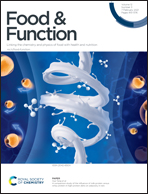Staple food and health: a comparative study of physiology and gut microbiota of mice fed with potato and traditional staple foods (corn, wheat and rice)
Abstract
The effects of potato and traditional staple foods (corn, wheat and rice) on physiology and gut microbiota were investigated by feeding ICR mice for 12 months. Compared with traditional staple foods, potato significantly improved the food and water intake and survival rate, and inhibited the swelling of viscera of mice, accompanied by a decreased white blood cell count and urine bilirubin content. Furthermore, potato significantly increased the relative abundance of Bacteroides and Faecalibacterium, which are short-chain fatty acid producing bacteria and play very important roles in the maintenance of human health. Meanwhile, potato significantly decreased the relative abundance of spoilage bacteria Pseudomonas and Thiobacillus. Analysis of putative metagenomes indicated that the potato diet upregulated the gene abundance of glycan biosynthesis and metabolism, digestive system and immune system. These findings indicated that potato has the potential to be an excellent substitute for traditional staple foods owing to its good physiological function and favorable gut microbiota modulation.



 Please wait while we load your content...
Please wait while we load your content...